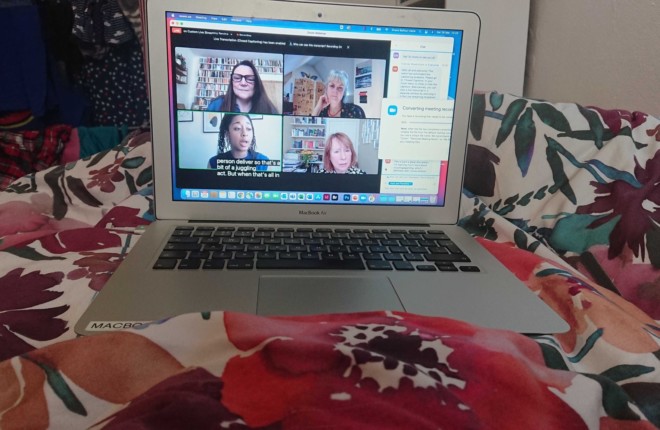
Spring Conference Freelance Fever
Posted on March 27, 2018 in Scotland

Panel: Kaite Welsh (author), Sian Bevan (freelance project manager), Denise Cowle (SfEP and freelancer), Claire Stewart (Creative Edinburgh)
Chair: Laura Jones
The panel, chaired by Laura Jones of 404 Ink who is also a book production and promotion freelancer, discussed the reality of freelancing, how to set yourself up and what is the best way to approach freelancing opportunities. The panellists in this breakout session were: Kaite Welsh, author, journalist and writing tutor, who runs workshops to support people in the creative industries; Sian Bevan, a part-time freelancer, who’s mainly involved in project managing in creative spheres; Denise Cowle, a freelance copy-editor, proofreader, and director of the Society for Editors and Proofreaders; and finally, Claire Stewart, a freelancer and director of Creative Edinburgh.
Laura began by introducing the reasoning and importance having this freelance panel in the conference. She explained there is a yearly increase in freelancers working in publishing and other creative industries, with the number of freelancers increasing to 300,000 in 2016 since 2009. In the creative industries specifically, 47% of people are now self-employed. Laura concluded that freelancers also tend to end up with varied portfolios, and you might get onto paths of professionalism you may not expect. This thought lead to the first question of the panel.
Are odd jobs worth it?
After brief introductions from the panellists, they started off with discussing whether taking odd jobs as a freelancer is worth it and whether you should only be focussing on creative industries. Opening the discussion was Sian, who has done everything from cat-sitting to production management as a freelancer. Her take on odd jobs was that they all come together and prove to be useful. There is always a thread you can follow, and most things end up being broadly in communications or customer services. Sian also informed that there’s always this doubt and struggle in freelancing, where you’re forever caught between paying rent and asking yourself why you’re doing this. If you’re fortunate enough to have private income, your long-term plans and dreams are much easier to execute, but the odd jobs do add up in the end (she also stressed the importance of working in festivals and meeting people this way). Sian explained it’s difficult to find someone who’s creative, able to meet people and do spreadsheets all in one. Such varied skills do help and later you’re able to pick things that add to the narrative of what you’ve done when applying to jobs.
Kaite agreed with Sian. There is always a theme you can work with – nothing you do will ever fit nicely, but you can create a story of your career that fits to your chosen job application or whatever you’re trying to do. As someone who’s had plenty of odd jobs and once worked as a strategic planner, Kaite’s learned many more skills that are valuable to freelancers: she’s a self-proclaimed “spreadsheet whiz” and loves business plans. However, you also must know your values and figure out your mission statement to fully understand why you’re freelancing, as it opens your mind to opportunities that are out there.
It is key that there are specific organisations that support freelancers. How do they assist?
Denise claimed that the most valuable things freelancers can get out of SfEP memberships (apart from training, of course) are the networks and forums, and speaking to people who are in the same industry as you in order to understand how it works. Members of the SfEP come from traditional publishing, with some working with journals, self-publishing or even proofreading board games and tattoos. As an organisation, the society is able to help people find their way through the freelancing business, as it is very daunting, and it encourages people to think of themselves as a business. Being able to market yourself and understand who you’re networking with is important and the SfEP helps freelancers develop confidence in these areas.
As the director of Creative Edinburgh, Claire Stewart often has chats with freelancers in their networking events and notes the magnitude of talking to other people in the industry – whether it’s in events or online forums – as this is where a lot of learning comes from. A lot of freelancers work from home, so shared work experience comes as great support to everyone. Having “virtual water coolers” for connecting with your peers really helps, Claire mused, and networking events get you out of your house and talking to people. These conversations are also vital in learning what their charging rates are as it enables you to determine your worth and avoid being consistently underpaid.
Collaboration without competition: how do you navigate this with supporting peers but not wasting your own time doing it for free?
The panel agreed again that it is important to know your worth and to never undervalue yourself. Sometimes you might not have the capacity to give the knowledge away for free. Knowing what you’re capable of and what needs work is important to understand too. Sian suggested sharing jobs, instead of jumping on every opportunity whether you are capable in doing it well or not; by having an environment where everyone is able to succeed, the industry will do much better in the long run. Claire recommended buddying up with someone to have a tight support group which can help you in discovering your strengths; it will also help if you don’t have time or capabilities to do the job, as you will be able to pass on the information to someone who is better.
In terms of acquiring links to industry people, Denise expressed you shouldn’t approach people for specific contacts straight away without any context as that is not the attitude in the business and will be considered impolite. The tools to find contacts are there for you as a freelancer, and if you’re willing to work in the industry you should be able to do your own research too. Kaite added that sometimes you might not have the capacity to give the knowledge away for free either, and therefore she runs workshops for those who need help for a small fee instead.
Tips for budding freelancers?
Laura then steered the discussion towards what new freelancers should be doing at the beginning of their careers. These useful tips are below.
Kaite: Having three months’ worth of living costs for when times are tough, but if you can, transition into freelancing gradually. Set measurable targets as you go along and make sure you reward yourself, and make sure you get a business plan together; having a plan makes any financial situation easier, and setting goals keeps you on track.
Sian: Get your shit together early – know what you want to do, what is your aim and place. Organise everything, the way you take notes, your website, inbox, learn how to budget. Remember you don’t have to go all in at once either; start working on your freelancing business in the evenings and build it up that way.
Denise: Put money aside for tax, do your accounts. Treat yourself as a business – have a website, a blog, a specific market. Widen your net by thinking where you can network, and that doesn’t have to be industry specific.
Claire: Attend free networking events run by Creative Scotland. Don’t think of other freelancers as competition – networking will get you intel on how much you should charge and where the work comes from. It keeps the freelancing ecosystem healthy.
Audience question: What if someone’s not paying you?
Kaite and Denise advised that it’s vital you put that information in your contract, ensure you charge a late fee and have your terms laid out clearly in the first place. Claire also suggested discussing your terms with the client beforehand, as well as automating your invoices (using tools like Free Agent). Such emails are more likely to get results, rather than personal invoices. It would also be beneficial to join a union as taking late fee disputes into court can end up being expensive, noted Sian. The SfEP offers free legal advice to their members as well, added Denise.
Finally, the panellists closed the session by sharing their favourite part of freelancing. For Kaite, no day is the same and she doesn’t get to do anything she hates; Sian simply said her life is awesome; Denise loves the flexibility and the fact that she gets to choose her hours; and Claire appreciated being able to build something that belongs to her and something that makes her feel good.
Overall, the panel focussed a lot on the importance of networking and creating ties with people from the industry, which is crucial in gaining experience and success. The more people are doing well, the more money there is in the industry, and the freelancing career path will be able to continue to thrive.
Blog by Marija Katiliute, SYP Scotland Conference Committee 2018
Photo by Chris Scott



 Listen to the podcast
Listen to the podcast  Explore the Youtube channel
Explore the Youtube channel